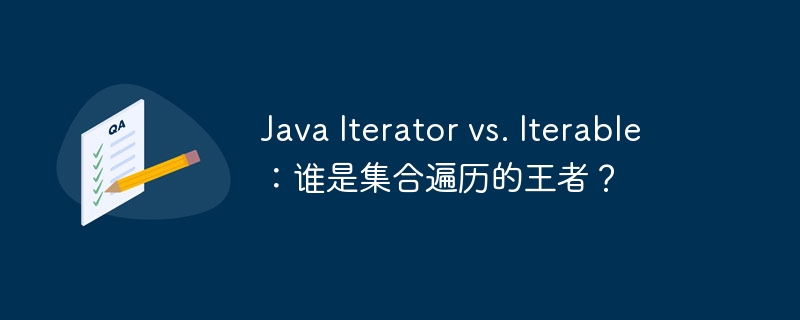Home >Java >javaTutorial >Java Iterator vs. Iterable: Who is the King of Collection Traversal?
Java Iterator vs. Iterable: Who is the King of Collection Traversal?
- WBOYWBOYWBOYWBOYWBOYWBOYWBOYWBOYWBOYWBOYWBOYWBOYWBforward
- 2024-02-19 12:40:081092browse

- Iterator: Iterator is a value traverser that can point to a specific element in the collection.
- Iterable: An Iterable is an iterator over an object that can be iterated over to access its elements.
Iterator and Iterable in Java are both important interfaces for collection traversal, and they play a vital role in actual development. So, who is the king of set traversal? This article will reveal the answer for you and give you an in-depth understanding of the differences and connections between Iterator and Iterable in Java, as well as their respective characteristics and applicable scenarios. Let's explore the mysteries of these two important interfaces in Java!
- Iterator: Traverse the collection by calling the hasNext() and next() methods of the Iterator object.
- Iterable: Iterate over a collection by using a for-each loop or the Streams api in Java 8.
Code Example
// 使用 Iterator 遍历集合
List<String> list = Arrays.asList("A", "B", "C");
Iterator<String> iterator = list.iterator();
while (iterator.hasNext()) {
String element = iterator.next();
System.out.println(element);
}
// 使用 Iterable 遍历集合
List<String> list = Arrays.asList("A", "B", "C");
for (String element : list) {
System.out.println(element);
}
Summarize
Iterator and Iterable are two important interfaces for collection traversal in Java. An Iterator is a value iterator that points to a specific element in a collection. An Iterable is an object iterator that can be iterated over to access its elements. Generally, use Iterator when you need fine-grained control over a collection, and use Iterable when you need a simpler, more convenient way to traverse a collection.
The above is the detailed content of Java Iterator vs. Iterable: Who is the King of Collection Traversal?. For more information, please follow other related articles on the PHP Chinese website!

